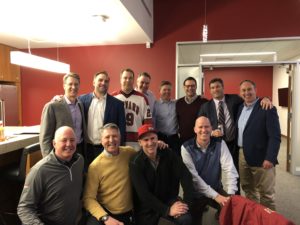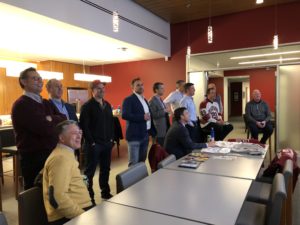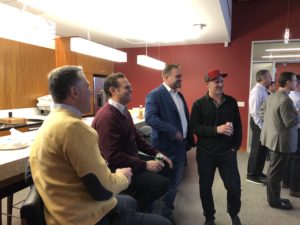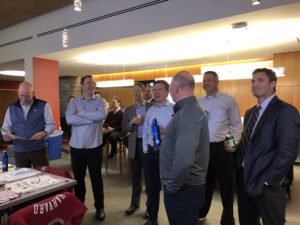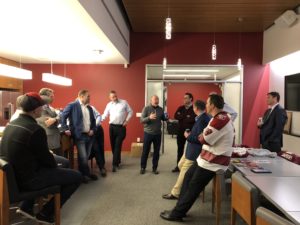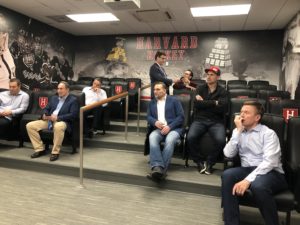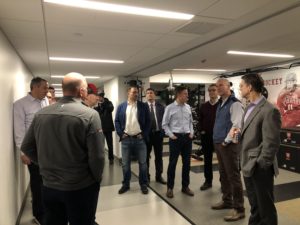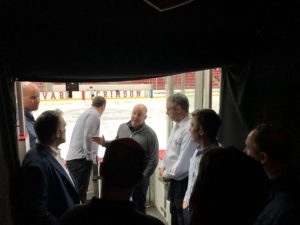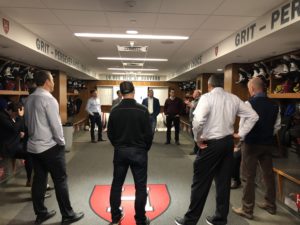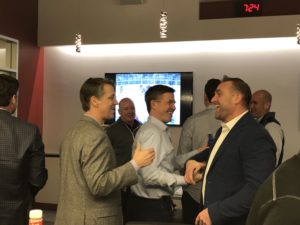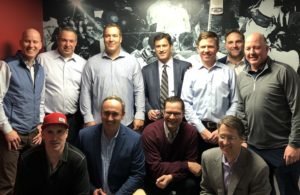30 Years Ago Harvard Ice Hockey Reached Pinnacle
Allston, Ma. – Harvard Men’s Ice Hockey hasn’t exactly been synonymous with winning over the years, especially in comparison to Boston’s other collegiate teams Boston University and Boston College. The program certainly has its fair share of history, being one of the oldest teams in the country, dating back to 1898. NCAA tournament appearances were an occasional occurrence during the 1950s, ’60s, and ’70s. In the 1980’s that all changed.
That decade had the Crimson qualifying for the tournament in seven of ten years. The team took tremendous strides by reaching the Frozen Four in four of those seasons. They captured the ultimate glory in just one, closing out the decade, in 1989. In the following thirty years, the Crimson has made the tournament eleven times, with two Frozen Four appearances in 1994 and 2017. In both cases, they lost in the semifinals by a goal.
The program has produced numerous NHL caliber players and Olympians throughout its storied past. It has been quite successful in having a player capture the Hobey Baker Award, for the nation’s top player, over the past 30+ years. The award, which started in 1981, does speak to the school’s history of producing elite players. Consider that in the last thirty-eight seasons a Crimson player has won the award four times. Since 1981 Wisconsin has won four National Championships but only one player has won the Hobey, in 2010; which is the polar opposite of the Crimson. North Dakota has five titles and two Hobey’s. The NCAA’s smallest Division One school Lake Superior St. captured NCAA glory three times while none of their players has won a Hobey.
Harvard has had two near misses in the Finals in 1983 and 1986. In both years the Crimson lost in the championship game. In ’83 Harvard lost 6-2 to Wisconsin. Coach Bill Cleary won the Spencer Penrose Award for Coach of the Year, his only one. While defenseman Mark Fusco won the school’s first Hobey Baker award, which was also the first time a defenseman won the award. In ’86 the Crimson was leading Michigan State 4-3 going into the third period. Harvard was unable to keep up with the Spartans, who pulled ahead with two early period goals. Harvard was able to tie the game at five but just ran out of gas. The Crimson were without that year’s Hobey Baker winner Scott Fusco, who was injured in the semifinal game versus Denver. Michigan State scored the game-winner with just 2:51 left in the game.
There were six players on that 1986 squad who would carry the bitterness of that Michigan State loss with them throughout their years at Harvard. This class, the Class of ’89, was arguably the most successful ever in Harvard hockey. They made the NCAA’s all four years, including three Frozen Four appearances. Losing in the final as freshman to MSU, losing to eventual Champion North Dakota in the semifinal, and again to MSU in the first round as juniors. That junior year had superstars Lane MacDonald and Allen Bourbeau off playing with the US Olympic team at the Calgary ’88 Winter Olympics.
The 1989 team was loaded, to say the least. MacDonald and Bourbeau were back from the Olympics. Juniors C.J. Young (29), John Murphy (22), Tod Hartje (22), and Ed Krayer. Sophomores Peter Ciavaglia (33), Ted Donato (26), John Weisbrod (19) and Mike Vukonich (23) were all ready to make the next jump in their collegiate careers. The Seniors, who lacked in point totals, but more than made up in experience, consisted of Josh Caplan, Ed Presz, Paul Howley, Nick Carone, and Craig Taucher. Not to mention Junior defensive stalwarts Kevan Melrose, Scott McCormack, and Brian Popiel. The incoming Freshman class would provide more defense from the likes of Brian McCormack and Kevin Sneddon. Rounding out the defensive theme was the goaltending tandem of Chuckie Hughes and Allain Roy. The duo split most of the season in an alternating game fashion. Sophomore Mike Francis had three starts in goal as well.
Corralling all this talent fell to coach Bill Cleary, himself a hockey legend. Cleary was a two-time All-American at Harvard, and won a Silver Medal in 1956 and a Gold Medal in 1960 for Team USA at the Winter Olympics. Some of Cleary’s records from his playing days at Harvard still stand. He has the most goals in a season (42) and most points in a season (89); both coming in the 1954-55 season. The 1954-55 season was also the first year that Harvard made the NCAA tournament. Cleary favored an open ice, fast tempo, skill game, which he clearly recruited for.
“It was crystal clear to me at our first meeting at the beginning of the year that our goal was to win the National Championship.”
– Lane MacDonald
The expectations among the players were high to start the 1989 season. They knew they had the talent but they also knew the game was tough and that anything could happen. The players weren’t taking anything for granted. “We had been to the Final Four 3 out of 4 years,” said Josh Caplan. “Success was kind of built into the expectation every year. We knew we had Lane and Al coming back from the Olympics. I don’t necessarily think anyone was predicting we were going to win the National Championship. But from what I can remember, certainly feeling confident, certainly predicting to be in the NCAA tournament for sure.”
“I wouldn’t say we were confident, but our expectations were pretty high” classmate Paul Howley added. “There was never a night we went to the rink and felt we would lose.”
To the incoming freshman, like Kevin Sneddon, it was a pretty daunting experience. “It was a special time. It was pretty intimidating, a little bit nerve-racking as a freshman” said Sneddon, now head coach of Vermont. “Despite feeling confident that you could play at that level, when you sat in that locker room and looked around and saw how many great players were returning, guys who had played a lot. I remember sitting there in the library one night when I was supposed to be studying and just thinking ‘I’m never going to play for this team. There’s not a chance!’”
For Chuckie Hughes, however, it just didn’t phase him. “I was coming from a high school team that was winning state championships, so I expected to win. Or maybe I just didn’t know any better” said the amiable goaltender.
The 1989 season kicked off with two games against fellow Ivy Leaguers, Yale and Brown at home in Bright Arena. A 6-2 win over Yale and a 3-2 squeaker over Brown. Then followed a three-game road trip against Army, Princeton, and Dartmouth. The Crimson won 6-1, 9-5, and 4-2 respectively. The first big test of the season came on November 25 as Boston College came to Allston for a heavyweight battle. The Eagles were expecting big things for themselves this season, as well, and came into this game nationally ranked. The Crimson would prevail 4-3 in overtime. “Teddy Donato scored the winning goal and celebrated right in front of us” recalled BC’s Marty McInnis.
A 10-1 drubbing of Brown would close out November. The Crimson were 7-0 and starting to feel good about themselves. The month of December would see Harvard down Colgate 8-2 and Cornell 9-1 at home. An away game at New Hampshire was closer than the previous games, as the Crimson eked out a 4-3 overtime win. A 10-0 beatdown of Dartmouth at home also featured a bit of NCAA history. Junior C.J. Young scored three goals, a hat trick, in just forty-nine seconds. All three were shorthanded goals, a record that still stands. Harvard ended December at 11-0.
Over the winter break, the team headed to Europe to play some professional teams. Some, like Howley, view this trip as the turning point of the Crimson season. “We were feeling really good about ourselves up until Christmas. And then Coach Cleary had us go over to Europe for maybe 10 days. We went to Sweden and Finland. We got killed! We lost some games by possibly double digits. We were playing Finish and Swedish Elite teams, on those wide rinks, in a style of play that coach Cleary was trying to emphasize with us. It was eye-opening to see the way the game could be played at that level. It was very humbling for us. I think a team can go one of two ways with that. It was re-inspiring. It was a bonding experience. Humbling and bonding.”
“It was a reminder that we weren’t that good” added Sneddon. “When we went overseas and played some excellent teams over there. There were some nights I don’t think we touched the puck very much. It was a good reality check that we’re good but we’re not that good.”
Once back Stateside, the run through the ECAC continued as January kicked off with a 4-1 win over RPI and a 3-2 win over Vermont, both games at home. To many of the players, this next trip, to the North Country in upstate New York would represent the biggest test of the season so far. A game at Clarkson is never fun for opposing teams, Walker Arena was a tough place to play. However, it would be the battle of unbeaten teams that piqued everyone’s interest, 14-0 Harvard visiting 15-0 St. Lawrence. The Crimson would roll into the #1 ranked Saint’s Appleton Arena with Sports Illustrated’s Austin Murphy in tow for the trip.
“You got the sense immediately that, in addition to being loaded, the team got along so well together” recalls Murphy. “They were a bunch of cut-ups. It was the opposite of what people think of when they think of Harvard. It was a good mix of refined kids, probably some prep school guys but also a great blue-collar flavor on the team. The chemistry on that team was what I remember most. It was a laugh riot and they were bringing it on the ice too.” As for the games themselves what Murphy remembers most is MacDonald and his overall presence. “I remember Lane MacDonald, he was studious, scholarly, so adult and then to see him on the ice. I still remember the burst, the jets, the way he was able to get around you on a rush. It was just a reminder that they were loaded.”
“When we beat St. Lawrence on the road, it was a huge game,” said Caplan. “I remember Sports Illustrated was traveling with us at that time too, he (Murphy) was on the bus with us. It was a really big game. And we beat them, fairly convincingly. It was just a total team win. It was traditionally a tough place to play. We beat them. We beat them well. And I just said ‘wow, this is a really special group.’ I remember getting really excited after that game.”
To Ted Donato, this game was the proverbial measuring stick. “We went in, on the road, to a really tough place to play, against a team that lost in the National Championship game the year before,” said Donato. “I think for us that was a big game. It was another chance to test our mettle.”
“We went up to St. Lawrence, they may have been ranked #1, and we were ranked second or third. It was a bit of a showdown” recalled MacDonald. “It was one where we felt it was a good opportunity, a good measuring stick. and we played a great game. It was all working. We had so much depth and so much talent. We just rolled, had a great game and really dominated. I think it was then that I felt ‘if we play that way, we are going to win, and we are going to win a National Championship’” said the captain in his modest, yet confident, matter of fact way. He also humbly left out that he scored a hat trick that night powering the Crimson to a 5-1 win.
Maybe it was an emotional letdown, maybe it was a rivalry thing, or maybe they ran into a hot goalie but the next game would be the first loss of the season for the Crimson. A 3-1 loss to school rival Yale at the hands, and legs, of goaltender Mike O’Neil. Many recalled that he stood on his head that night. January would end with Harvard at 15-1 through the season’s first three months. February opened with a 7-2 thumping of Princeton and an 11-1 drubbing of Army. This would set the stage for the “First Monday of February” and Boston’s fabled Beanpot tournament.
An opening round game against Boston College would kick off the historic tourney’s 37th year. BC’s McInnis said “I remember thinking we had two unbelievable games with them my freshman year. Chuck Hughes in that first round of the Beanpot, he made a lot of saves. Lane was better than everybody else, he was at a different level than 99% of the college kids.” The Crimson squeezed out another win over the Eagles 5-4 and would face-off against Boston University the following Monday in the Championship game at Boston Garden. But before that, there were still games against Cornell and Colgate to be dealt with. The Crimson beat the Big Red 4-2 but lost to the Raiders 6-5 in overtime for just their second regular-season loss, it would be their last.
The Beanpot had been a bit of a bugaboo for Harvard. They hadn’t played for the championship game since they won since it in 1981. BU, on the other hand, had played in the final for the last six years, going 2-4. The tournament back then came during exams, lest one forgets, this is Harvard. “I think it was our first game after exams. During exam period practice was optional, so you didn’t have a lot of full team practices leading up to it. So it was always kind of tough” said Caplan, who grew up locally in Wellesley, Ma. Harvard would prevail in a 9-6 barnburner. “It was a tough place to play too, the old Garden. When you skated on the Garden ice, after five minutes it was like skating on a pond on a sunny day. The puck was just bouncing everywhere. There was literally no room behind the net. It was a really tough place to play.”
“I was just so happy that number one, we were in the finals” recalled Howley, a Milton, Ma. native. “I always thought it was a cool way to win, it was our only win, but to do it in a shootout was kind of a fun way for Harvard to do it. I actually scored that night too. So I finally got to score in the Beanpot which I was happy about. That was such a fun game to play in.”
“Winning the Beanpot was huge,” said Donato, of Dedham, Ma. “It was a measuring stick as to where we were as a team. It did not have a lot of great memories for Harvard, so I think it was important if we thought we were going to have a chance to be successful down the end of the season then we needed to win Boston so to speak. We knew that teams like BC, BU and Northeastern were always very competitive games. We thought it was a great trial run to play in a big-time arena, I think the Beanpot was really important.”
To a goalie, like Hughes, the amount of goals Harvard gave up stood out. “I think for us, the Beanpot created a great sense of momentum, but if you kind of look around, that weekend we still gave up a ton of goals. So we still had a lot that we had to work on” said Hughes. “After the BU game, the numbers really came down in terms of how many goals we gave up and how we played the rest of the season.”
“The BU win, I think, was a big momentum piece for us.” –Chuckie Hughes
February continued with a 5-3 win at Vermont, a 4-3 overtime win against RPI in Troy, NY. There was a 4-2 victory at home over St. Lawrence, who slipped a little after that first Harvard loss. “It got their season going in the right direction and us going in the wrong direction” recalled Saints goalie Les Kuntar. The month, and the regular season ended with a 7-5 win over Clarkson, and the Crimson at 24-2 overall and 20-2 in ECAC play.
Harvard was the one seed in ECAC playoff action and hosted RPI for a two-game series. The Crimson won both, 7-3 and 5-4. Next up would be a return to the Boston Garden and a semi-final showdown against Vermont. The Crimson jumped out to a 2-0 lead, but UVM didn’t quit. Catamounts defenseman Jeff Schulman, now Athletic Director at Vermont (and Kevin Sneddon’s boss) remembers the scene vividly. “That was an incredible game to play in. The atmosphere at the Boston Garden was always special back then. I think it was during school break so a lot of UVM students were there. It was just a ton of energy in the building and Harvard was in the midst of such a fantastic season” said Schulman. “We actually got down 2-0 in that game. I scored one of my six career goals in that game and got us on the scoreboard making it 2-1. Then we tied it pretty late in the third. Then we were able to get the winner in overtime. It was probably the most exciting college hockey game that I ever played in.
I was able to develop a nice relationship with Coach Cleary after that when I get into Athletic Administration and he was A.D. at Harvard. Whenever we would see each other he would always say ‘Thank you’ to me. He really felt, the loss, that semifinal when we were able to beat Harvard was really important for them in terms of preparing for the national tournament.”
That was a general consensus among the players too. Certainly, the team had boxes that they wanted to check off as the season went along. Win the Beanpot, check. Win the ECAC regular season, check. Win the ECAC tournament, — So it gave pause to their mission, and they had to step back and refocus. Junior Tod Hartje referred to it as “the second crown of our triple crown that we were chasing.” He went on to say “Not having gotten that win, not winning that title was probably the best thing that could have happened. Because we had been rolling, all season, we had come into that with these huge expectations. And getting knocked down and losing that game sometimes is a great thing. At the right time. We lost our focus for a little bit. They capitalized. They won the game. We’re out, we don’t win the title and we’re like ‘that’s how easy it can happen. So don’t take it for granted.’”
“Everybody was pretty disappointed,” said Donato. “It was a wake-up call as to how hard it is to win and really refocused everybody. It brought us back down to reality. In looking back I think it was a lessoned learned.” Cornell paid the price 6-3 the next night in the consolation game.
“I remember walking away from that game (Vermont) disappointed but being excited about what’s coming next. The disappointment didn’t last long.” – Allain Roy
Now it was time for the NCAA Tournament to kick off. It wouldn’t be easy. The Crimson had home ice but had to host defending National Champion Lake Superior State. The Lakers were a big, physical, well-coached, deeply talented team in the midst of that school’s golden era. For a small school, located on the US-Canada border of Michigan’s Upper Peninsula, the Sault St. Marie had a good sized traveling fan base. Most players remember that the Lakers brought their band, which included an electric guitar.
“I was really lucky. Pretty much all four years we had a great fan base, students, alums, most games were packed. Certainly, those games were special” remembered MacDonald of the Lake St series. “I think everyone knew we had a special team, this was going to be our last time at Bright (Arena) playing and the place was absolutely rocking!”
To Sneddon, it was about the style of play. “We were playing a western team, it was a different style, they’re a real physical team, and I remember how important, it takes different pieces to make that championship run, and I remember how important Kevan Melrose was to that team, to our team at that point. A guy that was no matter how hard they wanted to play us, he was there to keep everybody in check. He was one tough customer, and the importance that he played in that series cannot be diminished. Just in terms of sticking up for our team against a team that wanted to come in and just thump us.”
For Donato, it didn’t matter who it was because it would be tough going. “I think we all felt very strongly, with us getting home ice and having to win a series to get to the final four, we were very confident no matter who we played it was going to be really hard if we played our best, at home, with our crowd, to come in and beat us. We knew we were playing an excellent team in Lake Superior State. A great goalie in Bruce Hoffort, who had won the national championship the year before. It was a great test for us but I think that we knew that we had a lot of confidence that at home we could get the job done.”
“We didn’t know a lot about them,” said Allain Roy. “The pre-scouting, they had a good team, tough coach in Frank Anzalone, a really good goalie. We didn’t know what quite to expect, but we prepared the right way. Didn’t veer from the game that we played all year, which is use our speed, stretch the defense, puck possession.” Roy had a good chuckle as he recalled the Lake St. band “They were two good games and they frigging brought their band to Harvard, with the electric bass!”
For Howley, it was all about the band when asked about the quarterfinals. “I’m laughing now that you say that, (chuckles) What I remember about Lake Superior State is, not we’re hosting the defending national champs, but their band. They had an electric guitar player and a full set of drums! That’s my memory from that series, they had a band. The band was four guys and they had an electric guitar player. It was dynamite! (laughs)”
Harvard edged the defending National Champs 4-2 and 5-2, with the combined 9-4 score. The quarterfinal games were decided on an aggregate score back then. This earned the Crimson the trip to the Frozen Four.
Now it was time to take the show on the road. The destination, from the start of the season, was St. Paul, Minnesota. Up first would be the Crimson’s most fierce sparring partner of the 1980’s NCAA Tournaments, the Michigan State Spartans. The two had met in three prior NCAA tournaments, with MSU having the 2-1 series edge. In ’83 Harvard struck first beating the Spartans 9-8 between two games. The Crimson won 6-5 and tied 3-3. In ’86 State got the better of Harvard 6-5 in the National Championship game. In ’88 The Spartans would knock out the Crimson. This time it was 11-8, with State winning 6-5 and 5-3 in both games of the quarterfinal.
Allain Roy would get the starting nod in goal as it was his turn to go. The Crimson jumped out to an early 2-0 first period lead on goals by Ciavaglia and Young. MacDonald would put the Crimson up 3-0 halfway thru the second. After two periods the Crimson were comfortably ahead 5-1. Donato and Krayer scored the next two Crimson goals. Danton Cole had put MSU on the board. In the third Krayer scored again to make it 6-1. State would score two more goals, Shawn Heaphy and Cole again, to make it interesting. Roy played amazingly all game and kept the door shut on a comeback.
“I felt good going into that game. I liked pressure games, that was as high pressure as it was going to get” remembered Roy. “I was familiar with that team somewhat because I knew Jason Muzzatti, I had played with Rod Brind’Amour on the under-18s (Team Canada), I kind of knew what we were facing there, I was excited. Kip Miller, all those guys, they had a good team, I knew they had a good offensive team, I knew I was probably going to see quite a few shots. I like those kinds of games. I’d rather have a 35 plus shot game than a 20 shot game. It’s easier to stay in as a goalie, and I got peppered pretty good in the first period. Which I felt good about.”
“They obviously had it rolling. Teddy Donato, Pete Ciavaglia were big parts of that team that beat us” said Spartans goal scorer and current head coach Danton Cole. “They got out to a bit of a lead on us, they got up 5-1, and then we battled back a little bit. Allain Roy was really good, we had 30-something shots on him. We averaged 6 or 7 goals a game that season, I think we had 92 power play goals. Certainly, a game where if we were going to give up 6 we had the capability of scoring 7. I think Allain had a great day and had something to say about it. It was a good hockey game, good up and down hockey. Unfortunately for us, we came up on the wrong end of it.”
“I don’t remember much of that game,” said Caplan. “I remember Allain making some amazing saves and bailing us out a bunch of times. He played an amazing, amazing game! And it just goes to show the confidence Coach Cleary had in both goalies. After that game, you might think ‘Oh my god no one could play better than that kid (Roy) did’ but he went to Chuckie in the finals instead of playing Allain again.” Donato agreed “We got timely goaltending. Some great saves by Allain.”
The final pitted Harvard against the Minnesota Golden Gophers. Despite the game being in St. Paul, the Crimson were the home team. They wore their home whites but were playing in front 15,000 Gopher fans. This was what they had prepared all season for, the National Championship game. The St. Paul Civic Center, with the infamous clear boards.
And as Caplan said, it was Chuckie Hughes’ turn in goal. The two freshman goalies had been splitting the duties all season, taking an every other game approach. “What happened was, and I don’t like talking about it because I get a lot of crap for it, but I got sick. And we rotated the rest of the way. I don’t think they played hunches or anything” recalled Hughes. “Basically, we stuck to a rotation and it was going. I was supposed to at Vermont and I got sick. I was throwing up. Al and I shared a room, which probably isn’t good to have the goalies, but I was throwing up that day and I said to coach at breakfast ‘I don’t know if I can go, but if you want me to I will. But I’ll be ready tomorrow if I just rest tonight.’ So he put Al in, beat Vermont, then I played the next night, we win in overtime against RPI. And the joke is after the fact after we win the National Title that I was calculating games and that I would do this to get into the National Championship. But it was not.”
“I always give Chuckie crap that he got sick halfway through the year which flip-flopped our rotation” chuckled Roy. “He knew that was the final! (laughs) It worked out for the best.”
“It’s an experience of a lifetime. It’s one thing to play in the championship game, but to play pretty much in somebody’s home building, and to hear the crowd spelling out M-I-N-N-E-S-O-T-A and that echoing all the way around.” – Kevin Sneddon
“It was great, it was a lot of fun. It wasn’t intimidating like you would think it would be maybe because you’re in a hostile place. I think just because the game was so big, we just didn’t really feel affected by it” said Caplan of playing the Gophers in St. Paul in front of so many Minnesota fans. “I think the game itself and the pressure of winning a National Championship was bigger than any crowd.”
“It was unique. Effectively playing an away game, was a unique feeling” recalled Howley. “I do remember the clear boards, which was really strange. And (Robb) Stauber (Minnesota’s goalie) had won the Hobey the year before, so I did feel it was going to be a different game than the Michigan State game. It felt like it was an away game.”
“The atmosphere was pretty wild, it was maybe 90% to 10% Minnesota supporters over Harvard’s but I think that’s what makes it special,” said Donato.
For Hartje, an Anoka, Minnesota native, it might have been just a tad more special. “For me personally, any run at a National Title in the NCAA is pretty memorable. But me, knowing that it was going to be in St. Paul, that rink with the glass boards, it was sort of iconic, it’s where we played the high school hockey tournaments, and I’d already been there and played in that tournament a few years earlier and I was debating was I going to go to Minnesota or was I going to go to Harvard? It was one of those things where all those guys were my peers, played with them in summer leagues and with them and against them for so many years, so having a chance to play them in front of everybody. My aunt and uncle were there but they were dressed in Gophers uniforms and they were saying ‘Hey thanks for the tickets but we’re rooting for the Gophers!’ So you have 15,000 people against you, literally against you, is cool.”
The Gophers jumped out to a 1-0 at 6:24 in the first period on a John Anderson snap-shot from just below the top of the right circle. That’s how the first would end. Harvard would even the score on a power play goal by Donato at 6:30 of the second. It was a slap shot from the blue line that just beat Stauber glove side. MacDonald and Bourbeau would get the assists. Four minutes later MacDonald would put the Crimson ahead with one of his vaunted rushes up the ice. He sped past a Gopher defender, then cut in front of Stauber and slid the puck past him. The Crimson lead would be short-lived, with Minnesota on the man advantage, the Gopher’s Jason Miller tied it at 2-2 at 13:01. Miller fired home a rebound on a shot from the point. After two periods this one would stay tied at 2.
Harvard’s Donato would net his second goal of the game (and third of the Frozen Four) at 12:53 of the third period. Donato backhanded a rebound over Stauber on a Sneddon rebound. Again the Gophers would answer quickly at 16:34. With John Weisbrod in the box for Cross-Checking, the Minnesota power play would even things at 3-3 when Peter Hankinson took a cross-ice pass and slapped a one-timer past, Hughes. Hughes got a piece of the puck, but not enough to stop it from going in. Like the previous two periods, this one would end in a tie. To overtime, it went.
“I remember after the third period, thinking ‘We’re on the brink of overtime, we’re on the brink of winning a National Championship’” recalled Caplan. “And I remember being on what I thought was being on the brink of winning a National Championship when I was a freshman. A part of my mind, I couldn’t help, was going the same way ‘I hope this doesn’t go the same way.’”
“My memory of that (in between) was the composure in the locker room,” said Howley. “Having the experience, often times having to go through some tough losses to actually eventually win. I do remember how remarkably calm it was. It just felt like another intermission. I do remember Lane talking about everyone playing within themselves, etc.”
In the overtime, the Gophers had a scoring chance that seen Randy Skarda hit the post. “People still talk about that game in Minnesota,” said Gopher Tom Chorske. “People refer to it as ‘the Skarda hit the post’ game.” It was actually the third post that the Gophers hit during the game, but that’s a part of the game. So it would continue on until there was a winner. It wouldn’t be a long wait. With a face-off in the Minnesota zone, to the right of Stauber, Ciavaglia would win the draw, Krayer would pass it back to Brian McCormick at the point. McCormick would fire a shot through traffic that Stauber would save, the rebound would fall out front, Krayer would corral the loose puck, with a Crimson and Gopher player down on the ice in front of Stauber, and backhand the puck past the goalie and into history. Harvard wins 4-3 in overtime.
“It’s emotional. You’re shocked” recalled Sneddon about the aftermath. “It was such a great hockey game, and then a little bit of a flukey play off of a face-off. Ed (Krayer) batted it in across the goal line. It all happens so fast, then chaos. Just chaos. Chaos in a great way.”
“I remember the rink going silent,” said defenseman Kevan Melrose. “I can remember the small Harvard contingent up in the corner going crazy. I remember Josh Caplan skating around crying because he was so excited to get it done. It was so emotional on the ice, you know, to score in OT like that with all the chips on the line.”
“It was surreal. Absolutely a surreal moment. I remember being overcome with emotion and actually crying after we scored the goal. It was surreal.” – Josh Caplan
“I do remember sitting on the bench, and it’s a bit surreal because you see the puck go in and you see Ed start to celebrate” remembered MacDonald. “You’re kind of like ‘OK we won’ and you sort of sit back and think ‘Did this just happen? Am I dreaming this or is it real?’ Then there’s elation. I’d say there’s also a relief because we were in many ways I think for many people expected to win. Satisfaction, then there is just the joy of sharing it with 25 of your closest friends, to share that victory as a group, the coaches, the administrators. That moment of sharing the achievement of that goal was so special with that group.”
To cap off the special weekend in St. Paul, it was announced on Sunday that Lane MacDonald had captured the Hobey Baker. The program’s third award of the 1980s. “Watching Lane’s pursuit of the Hobey, more so than winning the Championship, that was something real and acknowledged, and he was such a talent,” said Melrose of the award. “I think we paid more attention to that than we did to us having a chance at winning the NCAAs. Maybe it took our minds off what truly was the plan for the club because we got to watch him every night which was a real pleasure.”
All of the players expressed what it meant for them to win the National Championship, as well as what it meant for Harvard hockey. “We were playing for and representing a way that the game should be played, not just on the ice but in general,” said Caplan. “That you could be a student and an athlete. In the way we played, we were small, we were skilled. We weren’t big, we weren’t dirty. I think we were playing for a way that the game could be played both on and off the ice.” “It’s sort of the mystique of Harvard” added Hartje. “Having grown up in Minnesota, it was like ‘the Ivy League? Who goes out to the Ivy League? What kind of guys are they? They can’t play, they’re not going to work, they’re not going to skate. They’re all privileged’ that whole stereotype that existed back then.
You just don’t have that same cache in the hockey circles, even though we deserved it as a team. And had been showing it since the Fusco really got to the program, the skilled players on board. But it was just starting to happen and built that so it was still sort of the little guy against the big guy. Minnesota the established power of all hockey.”
Ted Donato knows what it’s like from both sides of the equation now. Having won as a player in 1989 and lost as a coach in 2017’s semifinal game. “ It think Coach Cleary really captured that uniqueness, that ability to be able to go to one of the world’s best academic universities and also have the chance to play at the highest levels athletically,” said Donato. “That really takes a special kind of person. A person committed to doing both things at a real high level. That’s something that Coach Cleary really preached. There was no question that we were playing for the University as well. We were excited to represent Harvard as well.
Coach Cleary always put us the underdog in the hockey world’s eyes. Whether it’s ‘these guys can’t go to a great school and be great hockey players’ and he wanted the game to be played a certain way with speed and skill and I think that our team took on that chip on our shoulders. ‘We’re not just a good team, we can be the best team and be student-athletes as well.’ That was something we all took pride in. And to me, that’s still the focus.”
On a March evening this year a dozen members of the 1989 team met at Bright-Landry Arena to watch the game against Minnesota. For some, it was the first time they had seen the game since it happened 30 years ago. For others, they have seen clips here and there. All have seen Ed Krayer’s overtime goal. Those in attendance were Lane MacDonald, Ted Donato, Chuckie Hughes, Ed Krayer, Josh Caplan, Paul Howley, Rich DeFreitas, Tim Burke, John Murphy, and Brian Popiel. Flying in for the evening was Mike Vukonich and Tod Hartje.
The bond for this team remains strong. Sometimes they only see each other at anniversary reunions, like the 25th, that happened at the arena five years ago. But whenever they do get together in any capacity it’s as if the years have never passed. The hierarchy that held firm then takes shape now, the jokes, the laughter, the love, is apparent for all to see.
Vukonich arrived with a treasure trove of memorabilia from that season. T-shirts from the Frozen Four, a Championship jacket, pins for different accomplishments, and his coup de grace…a game jersey that still fit albeit snugly.
During the viewing of the game’s first and second period, there was plenty of old-fashioned ribbing going on. Giving each other grief for missing a check, making a bad pass, or shooting the puck wide. There was the aforementioned needling of Hughes for “getting sick” at RPI. Donato liked to bust his classmate/line-mate Vukonich’s chops for pretty much anything he did or didn’t do, on the ice. None of the guys would own up to locking Sports Illustrated’s Austin Murphy in the restroom of the bus on the ride to Clarkson and St. Lawrence all those years ago.
In between the second and third periods, Donato gave a tour of the upgrades that have been taking place at the arena since they were last in the building. The weight room, the locker room, the video room. Mixed in with all of the new improvements are images of the program’s past history. A giant, almost life-sized image of the St. Paul celebration, a Fusco holding the Hobey Baker, or Jimmy Vesey in action. The former players marvel at the improvements made. The mere fact that there was a video room brought a good amount of laughter to the room, because, as Rich DeFreitas said sarcastically “we watched so much video back then.”
Watching the third period and overtime the joy of the players became more pronounced. They marveled at the equipment that goalies Hughes and his Minnesota counterpart Robb Stauber wore. There were numerous compliments of individual Gopher players like Tom Chorske, Dave Snuggerud, and Stauber. There was even some taunting of fans in attendance, as time wound down in overtime the broadcast showed a young boy cheering for his Gophers, someone yelled out “You’re about to get your heart ripped out kid!” Josh Caplan turned to Paul Howley and said “That kid’s 40 now” which caused a brief bit of sober reflection among the former players.
That didn’t last long as everyone cheered Krayer and his goal again like it was that April night thirty years ago. By now the evening had gone later than anticipated, cell phones were being checked, but no one was quite ready to go. The players, now in a circle, were trading stories of Coach Cleary or the exploits of former equipment manager Chet Stone. The comradery that was first apparent to SI’s Murphy was still apparent, as was the love, friendship, and bond that all that was spoken to or interviewed had expressed. Thirty years ago Coach Cleary told them in between the third period and overtime “if you win this one you walk together forever.” Thirty years on this team is still walking together. They are still the pinnacle that all other Harvard teams are trying to reach. The team that summited the mountain and closed out the greatest era in program history on top.

